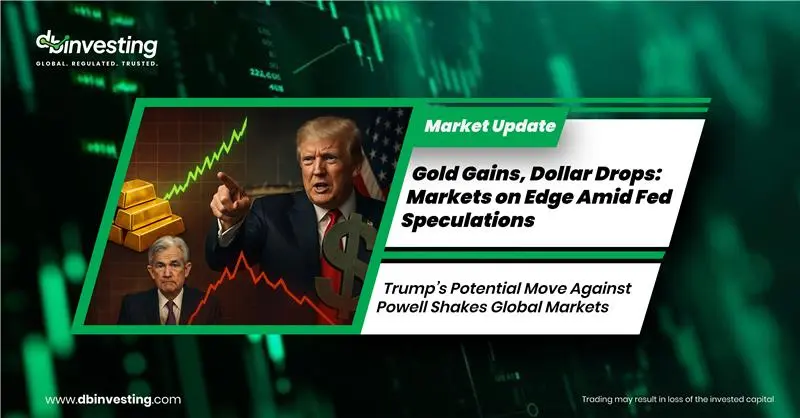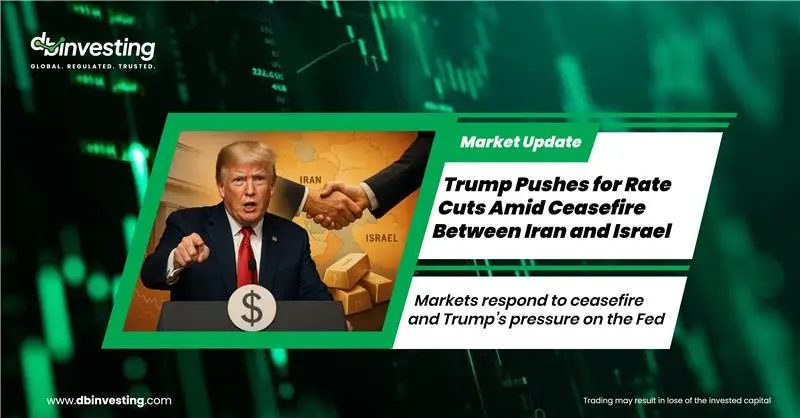Trump’s Potential Move Against Powell Shakes Global Markets
Gold prices rose slightly on Thursday, supported by the decline of the U.S. dollar and growing uncertainty in global markets. The surge followed reports suggesting that former U.S. President Donald Trump was considering replacing Federal Reserve Chair Jerome Powell as early as September or October.
These reports sparked widespread concerns about the future independence of the Federal Reserve, driving investors toward gold as a safe haven amid market turbulence.
The U.S. Dollar Index fell to its lowest level since March 2022, making dollar-priced gold cheaper for international buyers and boosting its appeal.
In testimony before a Senate committee on Wednesday, Powell noted that tariffs imposed by Trump could cause a temporary rise in prices but warned that persistent inflation risks required the Fed to act cautiously regarding further interest rate cuts.
Markets are now awaiting key U.S. economic data, including GDP figures expected later today and Personal Consumption Expenditures (PCE) data on Friday—both essential indicators that may influence the Fed’s next moves.
Geopolitical Scene:
On the geopolitical front, a U.S.-brokered ceasefire between Israel and Iran appeared to hold through Wednesday. Trump praised the swift resolution of the 12-day conflict during the NATO summit and stated his intention to demand that Iran abandon its nuclear ambitions in upcoming talks.
Asian currencies mostly rose on Thursday as the U.S. dollar continued to slide to its lowest level in over three years. Trump maintained his pressure on the Fed to lower interest rates and continued his criticism of Powell’s leadership.
A Wall Street Journal report that Trump was considering an early replacement for Powell further weakened the dollar and fueled bets that the Fed might cut rates as soon as July.
Oil prices rose slightly in Asian trading on Thursday, supported by a significant drop in U.S. crude inventories, boosting optimism about strong demand despite signs that the ceasefire between Israel and Iran remained intact.
The American Petroleum Institute reported that U.S. crude stocks dropped by 5.8 million barrels for the week ending June 20, far exceeding expectations of a 1.2 million barrel decrease. This followed a substantial drop of 11.5 million barrels the previous week, along with sharp declines in gasoline and distillate inventories.
The data indicated sustained fuel demand in the world’s largest consumer, especially as the busy summer travel season gains momentum.
Despite this, oil prices remained under pressure earlier in the week due to the ceasefire, which reduced the likelihood of near-term disruptions in Middle Eastern oil supplies.
Trump did not announce additional sanctions on Iran’s oil sector following the recent conflict, keeping regional oil supplies relatively stable. He also hinted at the possibility of easing sanctions to help rebuild the Islamic state, with nuclear talks scheduled for the following week.
Iran did not close the Strait of Hormuz—a key oil shipping route—avoiding significant disruptions to oil shipments to Europe and Asia.
🔚 Conclusion:
The markets remain highly sensitive to political moves and monetary policy speculations. While gold benefits from uncertainty, the oil market shows cautious optimism as geopolitical risks seem temporarily contained. All eyes are now on upcoming U.S. economic data and Trump’s next steps regarding the Federal Reserve.

